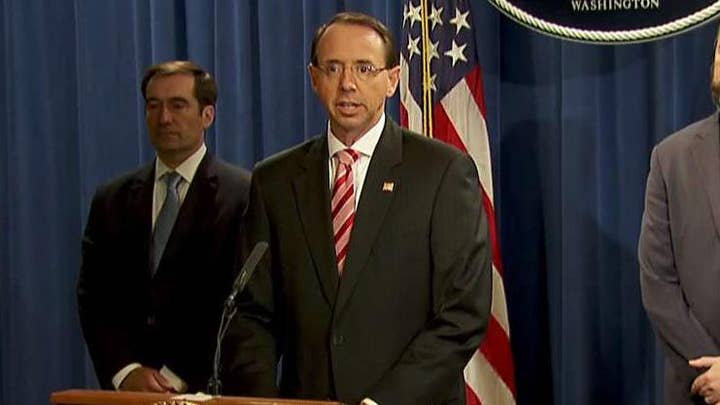The Democratic National Committee (DNC) claims it was targeted in a cyber attack – likely by Russian intelligence – just days after November's midterm elections.
The allegation was revealed in court documents filed overnight Thursday, with the DNC saying the hackers appear to have used the same techniques as the Russian hacking group “Cozy Bear” – or APT 29 – that is allegedly linked to Russian intelligence.
The cyber attack appears to have been unsuccessful, the DNC said in the complaint -- which is also a part of the lawsuit against the Russian government over claims the organizations was hacked during the 2016 presidential election.
12 RUSSIAN INTEL OFFICIALS INDICTED FOR ALLEGEDLY HACKING CLINTON CAMPAIGN, DNC EMAILS: WHAT TO KNOW
“On November 14, 2018, dozens of DNC email addresses were targeted in a spear-phishing campaign, although there is no evidence that the attack was successful,” the DNC wrote in the complaint, according to ABC News.
“Therefore, it is probable that Russian intelligence again attempted to unlawfully infiltrate DNC computers in November 2018,” the filing added.
The filings indicate that the alleged Russian group used the so-called “spear-phishing” technique in which hackers send a malicious link from a supposedly legitimate person or a source to people in an attempt to trick them into opening the link that would allow the hackers to steal data.
WIKILEAKS REQUESTS DISMISSAL OF DNC LAWSUIT, CITING FIRST AMENDMENT RIGHTS: REPORTS
In the most recent alleged cyber attack against the DNC, hackers used email accounts that falsely gave an impression they were from the U.S. State Department, cybersecurity firm FireEye said in an article. They reportedly targeted various entities, including defense contractors.
But FireEye doesn’t say that the cyber attack definitely came from Russia – only that the effort mirrors the techniques used by groups linked to Russian intelligence.
“There are several similarities and technical overlaps between the 14 November 2018, phishing campaign and the suspected APT29 phishing campaign on 9 November 2016, both of which occurred shortly after U.S. elections,” the firm wrote.
CLICK HERE TO GET THE FOX NEWS APP
“APT29 is a sophisticated actor, and while sophisticated actors are not infallible, seemingly blatant mistakes are cause for pause when considering historical uses of deception by Russian intelligence services,” it added.






